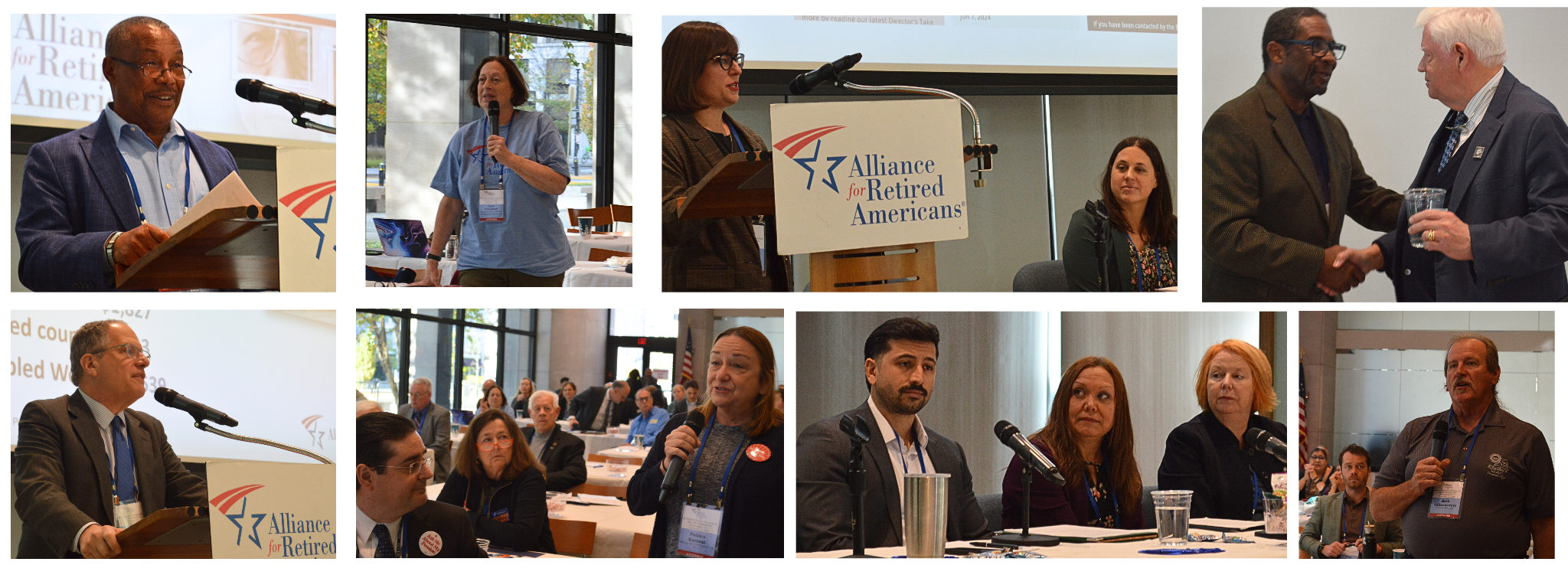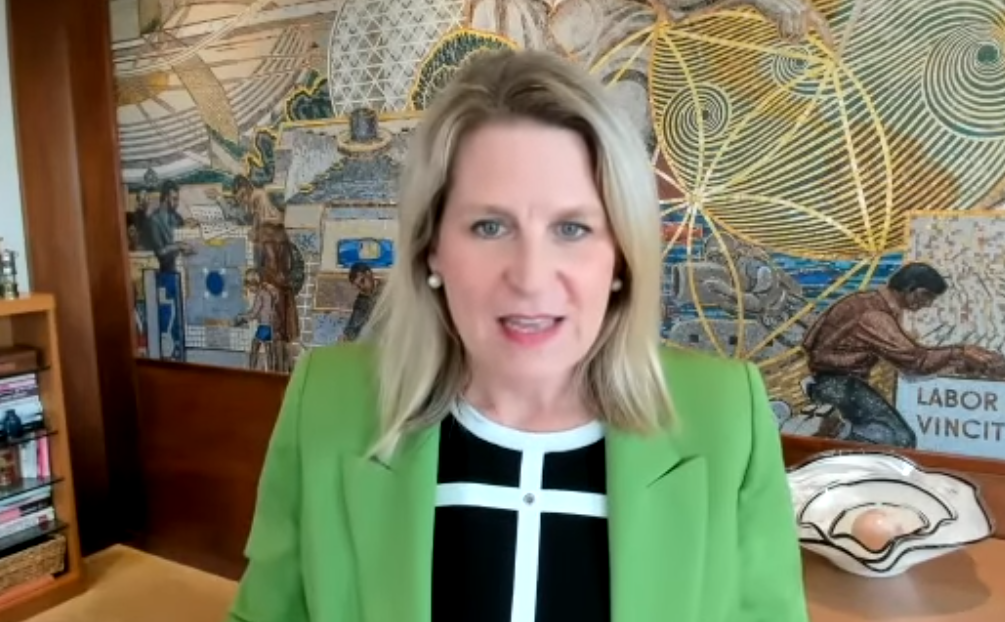|
|
Alliance/AFL-CIO Symposium Addresses the Looming Retirement Security Crisis |
|
The Alliance and the AFL-CIO held their annual Retiree Security Symposium, The Looming Retirement Security Crisis, on Wednesday at AFL-CIO headquarters in Washington, DC. Presenters and attendees discussed the future of retirement security and how to face it as a movement, as well as the role of personal responsibility. The program included a special focus on how the Butch Lewis Act is working, efforts to build on it to further protect pensions, and repercussions from bankruptcies. |
|
|
AFL-CIO President Liz Shuler kicked off the program with a video that was introduced by Robert Roach, Jr., President of the Alliance. President Roach also served as the emcee.
“Our leader, President Shuler, is absolutely the inspiration for the Alliance and the AFL-CIO coming together every year to address important retirement security issues,” said President Roach. “Her father, Lance, was an IBEW member and her family’s history of defending pensions has prepared her to lead us in this fight.
He added, “I served with her on the AFL-CIO’s Retirement Security Executive Committee. I have observed her coordinating the discussion among 50 international union presidents who had different ideas on how to achieve our shared goals. She was able to bring everyone together so that the Butch Lewis Act could become the law of the land.”
“We know the Trump administration is going to follow their Project 2025 playbook, which includes stripping workers of their right to organize and targeting our social safety nets by cutting Social Security and gutting our retirement security,” said President Shuler. “It’s a playbook we’ve seen before, and we know how to beat back these attacks: by standing unified with fellow retirees, and with workers in the middle of their careers, and with workers just starting out. Our solidarity is how we protect our retirement and the retirement security of the workers of today, and the generations of workers to come.”
Click below to hear President Shuler’s full remarks. |
|
Rep. John Larson (CT), Ranking Member of the House Ways and Means Social Security Subcommittee, spoke about the need to protect Social Security following last week’s election results.
“After Trump leaves office, if nothing is done to reform and pay for Social Security except he puts through his tax cut, there’ll be two years left before Social Security would be hit with insolvency,” said Rep Larson. “It’ll still be there, because that’s how strong this trust fund is, but everybody will receive 20% less…How can we as Americans stand by and see 5 million of our fellow citizens living below poverty level for something they contributed to while they worked? That’s unconscionable. We need the AFL-CIO. We need every activist we can find.”
Phil Smith, Executive Assistant with the United Mine Workers of America, spoke about “Mine Workers Pensions: How We Got Here and Where We Are Going.” Richard Fiesta, Executive Director of the Alliance, discussed “Post Election - Next Steps for Social Security.”
In addition, Ken Stribling, President, National United Committee to Protect Pensions (NUCPP), gave a presentation entitled, “Butch Lewis Update: Still More Work To Do.” Jeff Cruz, Legislative Representative with AFGE, spoke about “Implementing a Secure Retirement for All.”
A highlight of the symposium was the panels. “Protecting your Money: Tips from the Securities and Exchange Commission (SEC) and Consumer Financial Protection Bureau (CFPB),” featured Brynne Keith-Jennings, Engagement and Policy Fellow with the Office of Financial Protection for Older Americans at CFPB, and Erin Scheithe with the SEC's Office of Investor Education and Advocacy.
A Pension Benefit Guaranty Corporation (PBGC) panel’s update, “PBGC’s Pension Insurance Programs, Forecasting and Pension Trends, and Mitigating Risks to the Insurance Program,” featured Ann Orr, Acting Director of PBGC; Anne Henderson, Senior Advisor with PBGC's Office of Policy and External Affairs; Kevin Muse with PBGC's Actuary, Policy, Research, and Analysis Department; and Adi Berger, Director of the Corporate Finance & Restructuring Department.
A third panel, moderated by Brandon Rees, Deputy Director of Corporations and Capital Markets (AFL-CIO), was entitled, “Keeping The Pension Promise: How to Win Retirement Security for All Americans.” It included input from Sisto Campana, Labor Advocate with AFSCME; Monique Morrisey, Senior Economist with the Economic Policy Institute; and Ilana Boivie, Senior Economist with IAM.
Video of the event and additional materials are available here. |
|
Alliance Applauds House of Representatives’ Passage of Social Security Fairness Act; Calls on Senate to Act |
|
The U.S. House overwhelmingly passed a bill on Tuesday night that could raise Social Security benefits for millions of Americans who worked in public service, as well as their families. The vote was 327-75.
The legislation addresses the Government Pension Offset (GPO) and Windfall Elimination Provision (WEP), provisions which unfairly reduce Social Security benefits for public sector retirees who receive a public pension — or the spouse or survivor of a Social Security beneficiary — who worked in a job not covered by the Social Security program.
For decades, the two Social Security law provisions have unjustly deprived more than 2 million public service retirees of the benefits they have earned.
“The House voted to correct a serious injustice involving Social Security benefits that has been a problem for decades,” said Executive Director Fiesta. “Retirees thank lawmakers for taking this much needed action.
He continued, “Many Alliance members and other retirees are seeing their Social Security benefits reduced by hundreds of dollars a month. The economic harm to their quality of life cannot be overstated.”
ACTION NEEDED: For this important bill to become law, the Senate must also approve it. More than 60 Senators have already cosponsored the Senate version of the bill (S. 597).
Please click here to tell your senators to support this critical legislation and push for a vote before the end of the year. |
|
Republicans Keep Control of the House |
|
Republicans have won enough seats to control the U.S. House. GOP victories in Arizona and California gave Republicans the 218 House victories needed for the majority. Eight house races have yet to be called.
President-elect Trump nominated Rep. Matt Gaetz (FL) later on Wednesday to be the next U.S. Attorney General, and Gaetz quickly resigned his House seat. The GOP is still expected to have at least 218 seats — but not much more.
“The Republicans will have a very thin majority,” said President Roach. “Going forward, it will be even more important for us to get some Republican votes to stop bills that attack our hard earned Social Security and Medicare benefits from becoming law.” |
John Thune of South Dakota is Elected New Senate Majority Leader |
|
Senate Republicans have elected Sen. John Thune (SD) as the next Senate majority leader.
“Sen. Thune has earned a lifetime pro-retiree score of 13% in the Alliance for Retired Americans Voting Record,” said Joseph Peters, Jr., Secretary-Treasurer of the Alliance. “It is vital that we keep the filibuster rule that requires 60 votes to pass a bill in the Senate. That will be necessary as we face continued efforts by the GOP to not only slash Social Security and Medicare, but repeal the law we passed during the Biden-Harris administration that caps insulin costs as $35 a month and requires Medicare to negotiate lower drug prices.” |
|
KFF Health News: Scientists Fear What’s Next for Public Health if RFK Jr. Is Allowed To ‘Go Wild’ By Arthur Allen |
|
Many scientists at the federal health agencies await the second Donald Trump administration with dread as well as uncertainty over how the president-elect will reconcile starkly different philosophies among the leaders of his team.
Trump announced Thursday he’ll nominate Robert F. Kennedy Jr. to be secretary of the Health and Human Services Department, after saying during his campaign he’d let the anti-vaccine activist “go wild” on medicines, food, and health.
Should Kennedy win Senate confirmation, his critics say a radical anti-establishment medical movement with roots in past centuries would take power, threatening the achievements of a science-based public health order painstakingly built since World War II.
Read more here. |
|
Thanks for reading. Every day, we're fighting to lower prescription drug prices and protect retirees' earned benefits and health care. But we can't do it without your help. Please support our work by donating below. |
|
|
|
|
Alliance for Retired Americans | 815 16th Street, NW | Washington, DC 20006 | www.retiredamericans.org



